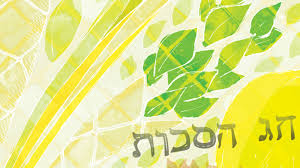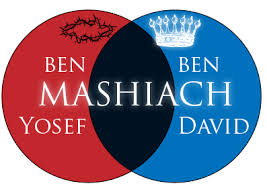The Jewish Concept of Two Messiah’s
Sanhedrin 98a
Now Ya’akov sent Judah, once again taking a leadership role, ahead of him to Joseph to get directions to Goshen (Genesis 46:28a). Messianic rabbis have long recognized the many similarities between Joseph and Jesus (I list eighty ways in which Joseph foreshadows the life of Christ in my commentary on Genesis, to see link click Iw – The Written Account of the Generations of Jacob). But the anit-Missionaries believe that Genesis 46:28-29a teaches that there will be two Messiahs. They teach that Joseph would receive the Kingdom before Judah, because Joseph was in Egypt before Judah. They believe that a descendant of Joseph will be the first Messiah, or the suffering Messiah (Isaiah 53), and the second Messiah, a descendant of Judah, and then David, will be the kingly Messiah (Psalm 72). When they arrived in the region of Goshen, Joseph quickly had his chariot made ready and went to Goshen to meet his father Isra’el (Genesis 46:28b-29a). The anti-Missionaries want to separate the Messiah in this way; however, what they fail to see is that the greatest example of suffering in the TaNaKh, apart from Job, is David!

As we approach the High Holy Days, I believe there is some important evidence that is often overlooked in regard to Messiah’s two-fold ministry. Sukkot (to see link click Gn – Conflict at the Feast of Booths), besides being a celebration of the fall harvest, is also understood to be a prophetic picture of the Kingdom of Messiah. We build our Sukkot/temporary huts to remind us of the great truth that the day is coming when Messiah will “dwell or tabernacle” in our midst and fulfill the promises as Ben David. This must be the reason that Prophets foretell of the kingdom celebration of this feast among all the redeemed, both Jew and non-Jew: Then it will come about that any who are left of all the nations that went against Jerusalem will go up from year to year to worship the King, the Lord of hosts, and to celebrate the Feast of Tabernacles (Zechariah 14:16). It makes sense that Sukkot will be the preeminent feast in the Kingdom since Messiah would then be dwelling with His people!
Yet within this Fall feast is also hidden the secondary aspect of Messiah’s work; namely His suffering for the atonement of our sins. This means that there must be some kind of connection between Sukkot and the First Coming of the Messiah as the Messianic Jews would see it. I find it interesting that there has always been some debate about when Yeshua was actually born in the world. Most Western Christians celebrate Christmas on December 25 as the designated day to remember the Messiah’s First Coming. Perhaps many people, both Jews and Gentiles, have overlooked the important holy day of Sukkot as God’s time to celebrate the First Coming of Messiah as well? As the Jewish believer wrote in the first century: In the beginning was the Word, and the Word was with God, and the Word was God . . . And the Word became flesh and dwelt (literally, tabernacled) among us (John 1:1 and 14).
The last day of Sukkot is an additional festival day that the Torah calls The Eighth Day (see the commentary on The Life of Christ Gp – On the Last and Greatest Day of the Feast). If Yeshua was born on the first day of Sukkot, they must have circumcised Him on the day called the Eighth Day (see The Life of Christ At – On the Eighth Day, When it was Time to Circumcise Him, He was Named Yeshua), thereby literally fulfilling the scripture which says: On the eighth day the flesh of his foreskin shall be circumcised (Leviticus 12:3).
How perfect! As the writer thinks of the First Coming of Yeshua, he makes the connection to our ancient feast of Sukkot. Indeed, Messiah dwelt with His people at His First Coming to Isra’el as Ben Yosef. Through His death and resurrection, Yeshua of Nazareth is able to fulfill the other aspect of the Messianic call as Ben David. He is returning soon to complete the whole plan of the Father. By Rabbi Barney Kasdan.

Because of their inability to see the two separate comings of Yeshua Messiah, the rabbis teach that there are two Messiah’s, the suffering Messiah of Joseph and the kingly Messiah of David (Matthew 9:27). They taught that it was a messianic term, which needed to be directed toward a descendant of King David and therefore called him Meshiach ben-David, or Messiah Son of David (Tractate Sukkah 52a). They teach that how the Messiah comes will be based on merit, or what the Jewish people have earned. If they are worthy, one like a son of man will come in all His glory on the clouds of heaven (Dani’el 7:13-14); but, if they are not worthy, Messiah will come in humility riding on the colt of a donkey (Zechariah 9:9).
In the discussion regarding this verse in the Babylonian Talmud (Sanhedrin 98a) a story is told of the Persian king Shevor, who asks: Why doesn’t your Messiah come riding on a horse? If he lacks one, I’ll be glad to provide him with one of my best!
The rabbis teach that “the Messiah’s donkey,” will be multicolored. Today, the phrase “the Messiah’s donkey” is used to refer to someone who does the ‘dirty work’ on behalf of someone else.1732



Re – Daniel 7:13; Jews believe that “one like a man” refers to the people of Israel. Christians believe that it refers to the messiah and cite the following passage from the Talmud. Sanhedrin 98a:13: “Rabbi Alexandri says: Rabbi Yehoshua ben Levi raises a contradiction between two depictions of the coming of the Messiah. It is written: “There came with the clouds of heaven, one like unto a son of man…and there was given him dominion and glory and a kingdom…his dominion is an everlasting dominion” (Daniel 7:13–14). And it is written: “Behold, your king will come to you; he is just and victorious; lowly and riding upon a donkey and upon a colt, the foal of a donkey” (Zechariah 9:9). Rabbi Alexandri explains: If the Jewish people merit redemption, the Messiah will come in a miraculous manner with the clouds of heaven.”
How do you respond to the Christian view?